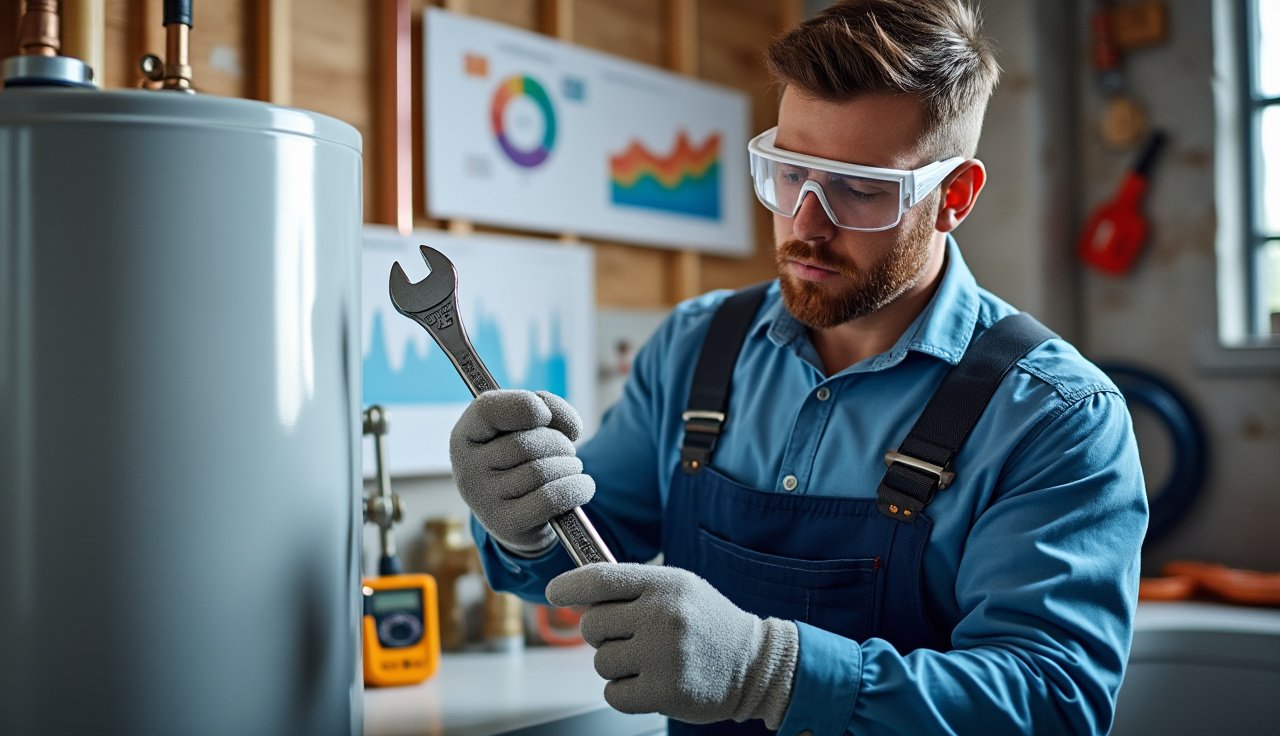For effective maintenance on water heater is key to saving time and money. You are in the right place. I’ve tested simple methods to keep your water heater happy. Trust me—I learned from my own hands-on experience. Listen up: Regular care and easy checks boost your water heater’s performance and save energy. This guide blends real-life tips with data insights to help you do preventive maintenance and encourage energy efficient practices. Instead of waiting for urgent repairs, simple upkeep can extend your unit’s life. I’ll walk you through proven techniques that go beyond typical water heater service and repair advice. Enjoy practical tips that are easy to follow. Stick with me, and you’ll keep your water heater running smoothly every season. Remember, your comfort and safety matter most.
Data-Driven Preventative Maintenance Strategies

Hey there, let’s dive in. When you think about maintenance on water heater, using real data makes a big difference. We can spot issues before they become big problems. By tracking water heater cleaning routines and flush water heater procedures, you can keep your system in tip-top shape. It’s simple and proven.
An annual water heater maintenance schedule is a game changer. Using real metrics helps you follow best practices. This means doing a water heater tune-up and performing a water heater safety check on a regular basis. It also means keeping an eye on sediment buildup water heater concerns and working to avoid water heater corrosion. These tips work for both electric water heater maintenance and gas water heater maintenance.
A detailed water heater inspection process boosts your confidence. Think of this as your personal water heater diagnostic. Checking water heater safety, spotting sediment issues, and confirming there is no corrosion will keep things running smoothly. You gain peace of mind with a few quick checks each year.
Annual Maintenance Checklist
Imagine a checklist that makes your maintenance routine clear. Key points to track include: – Water heater thermostat calibration water heater – Pressure relief valve check – Anode rod inspection
Regular checks like these show real improvements in water heater efficiency. They also help reduce energy usage significantly. Scheduling regular water heater inspections and diagnostics can stop emergency repair calls and save money.
Data-Driven Diagnostic Techniques
Using data to inspect your water heater is smart. A periodic water heater system check helps catch issues early. Look for abnormal readings during water heater performance reviews. You can measure water heater efficiency using simple data metrics. This practice also helps you see the environmental impact water heater considerations can have.
Quick diagnostic tricks include: – Checking for water heater leak detection – Watching for abnormal sediment buildup
These techniques are simple, proven, and help you catch things before they get worse.
Preventative Maintenance Best Practices
Preventative steps are key. Keep a maintenance checklist water heater that covers every step. This list should include both electric water heater maintenance and gas water heater maintenance to cover all bases. Integrating water heater cleaning chemicals safely is crucial and works well with a water heater safety check. Following your water heater preventive maintenance checklist helps you avoid those sudden, costly emergencies.
Below is a helpful table that adds more insight into these practices:
| Maintenance Task | Recommended Frequency | Benefits |
|---|---|---|
| Water heater cleaning | Every 6-12 months | Keeps the system efficient, reduces sediment buildup |
| Flush water heater procedures | Annually | Prevents corrosion and improves water quality |
| Pressure relief valve check | Every 6 months | Ensures safety and avoids pressure buildup |
Remember these power tips: – Keep it simple. – Check regularly. – Use data to guide your actions. – Schedule timely maintenance.
This approach to maintenance on water heater makes it quick and easy to keep your system safe and efficient. Stick with these actionable tips, and enjoy the peace of mind that comes from being well-prepared for any water heater challenge.
DIY vs. Professional Service: Informed Choices
Have you ever wondered how to best care for your water heater? Let’s break it down in a simple way.
When you try DIY maintenance on your water heater, you learn neat tricks. I once fixed a simple drain issue myself. A little care goes a long way.
But sometimes, calling a pro is the smarter choice. If things seem tricky, a water heater service technician can save you time and stress. They bring tools and deep know‐how.
Here’s a quick look at both choices:
| Approach | Estimated Cost | Skill Level Needed | Safety Tips | Long-Term Benefits |
|---|---|---|---|---|
| DIY | Low | Basic | Always turn off power | Learn more about your heater |
| Professional | Moderate-High | Expert | Follow all protocols | Prevent costly future issues |
Sometimes a simple tune-up is safe to do yourself. Other times, a pro can replace parts and check the water heater pilot light with ease. Think about the cost, time, and safety when you decide.
DIY Water Heater Maintenance Tips
Start with easy fixes. Drain cleaning and a quick inspection can keep your water heater happy. A small manual adjustment of the temperature setting is a simple fix.
I once performed a full tank water heater maintenance check on my own. I made sure to wear gloves and follow safety tips. Here’s a short list of DIY tasks to consider: – Check the temperature setting. – Drain and clean the tank. – Look for signs of rust. – Tighten any loose parts.
If you follow these steps, your maintenance on water heater can be cost-effective and rewarding.
Professional Water Heater Service Insights
Professional service comes with amazing benefits. Experts can do a detailed water heater inspection and diagnostics. They can spot hidden issues early.
A service call covers tasks like water heater parts replacement and a pilot light check. Whether you have a tankless water heater service or a storage water heater, pros ensure energy efficient operation. They often discuss repair cost considerations and warranty maintenance. A pro inspection may save you from higher bills down the road.
Cost-Benefit Analysis of Maintenance Approaches
Here’s the simple truth: DIY and professional care both have their wins. Data shows regular upkeep saves money over time. If your water heater is older, targeted repairs can extend its life.
Consider these points when planning your maintenance on water heater: – DIY tasks are quick and budget-friendly. – Professional care reduces the risk of dangerous mistakes. – A routine maintenance schedule can lead to long-term savings.
Following these ideas keeps both residential and commercial water heaters running smoothly while saving you energy and money.
Maintenance on water heater is simple when you follow a regular check routine. A basic maintenance on water heater plan improves efficiency and extends the life of your appliance.
Ready to make a change?:
Check important parts like the thermostat, pressure relief valve, and anode rod. A few simple steps today prevent expensive repairs tomorrow. Keeping your system clean not only saves energy but also ensures safe operation. Follow the guide and enjoy steady hot water and lower bills. Each tip is designed to be easy and effective so that anyone can follow along. Stay proactive with routine checks and trust that your efforts will boost overall performance and longevity for your water heater. Regular upkeep is key to avoiding surprises and ensuring long-lasting performance.
